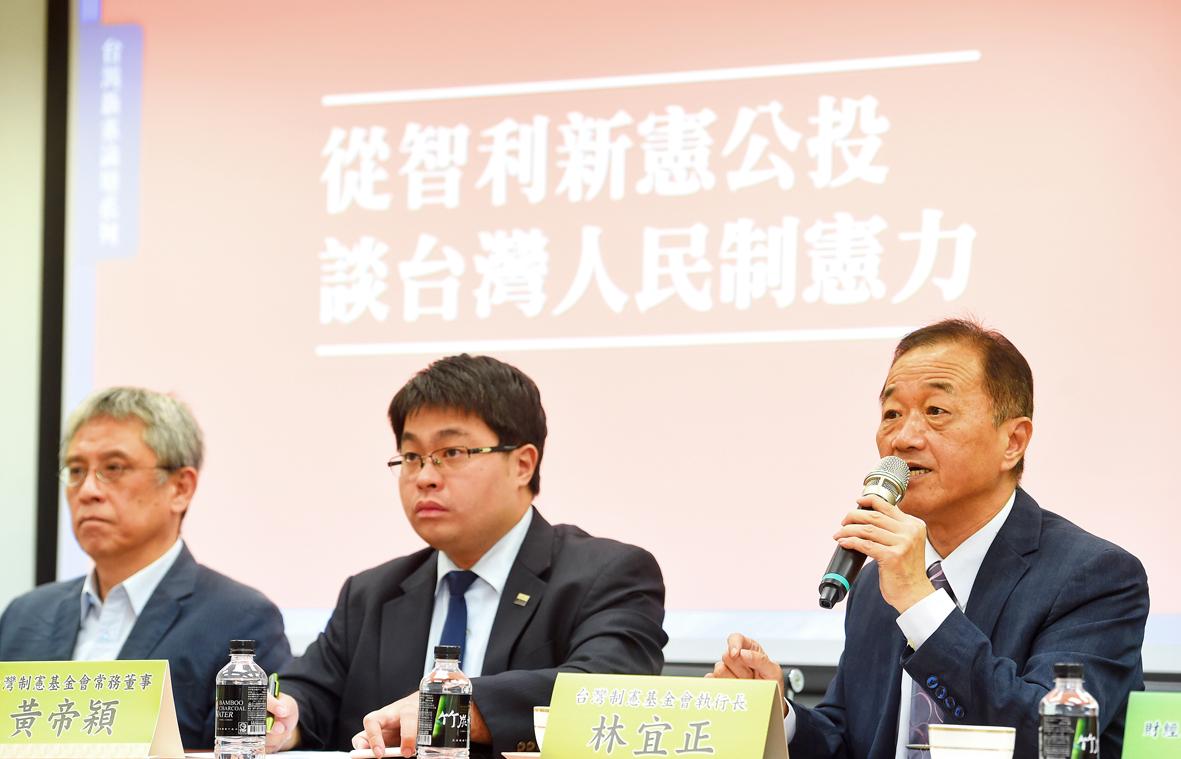Experts at a forum organized by the Taiwan New Constitution Foundation in Taipei yesterday compared constitutional reform efforts in Chile and Taiwan, saying that the Legislative Yuan’s newly formed committee on the issue would “accomplish nothing.”
Chileans on Oct. 25 voted on whether to draft a new constitution to replace the one written during the military dictatorship of General Augusto Pinochet, and if so, which type of government a constitution should stipulate.
More than 78 percent of voters supported drafting a new constitution, while 79 percent preferred a government elected entirely by popular vote, rather than splitting the decision with the legislature.

Photo: Liu Hsin-de, Taipei Times
Chilean society has experienced severe economic inequality exacerbated by the privatization of healthcare, pensions and other services, said Kung Kwo-wei (宮國威), an associate professor and chairman of the Graduate Institute of Latin American Studies at Tamkang University.
Protests broke out in October last year over a 30 peso (US$0.04) increase in public transportation fares in the Chilean capital, Santiago, and the protests, which gradually developed into widespread unrest, reflected the society’s long-standing inequities, Kung said.
The South American nation is run like a large corporation with a government that neglects its social responsibility, he added.
Unlike Chile, a similar referendum proposal brought by the foundation was rejected by the Central Election Commission last month, foundation executive director Lin Yi-cheng (林宜正) said.
The election commissions reasons for rejecting the proposal were outrageous, including its statement that changes to the Constitution could be made through amendments and writing a new one was therefore unnecessary, he said.
The commission also said that only a nonbinding consultative referendum would be possible, but said that the proposal’s wording, “Do you support the president in pushing for the establishment of a new constitution reflecting the reality of Taiwan?” would be confusing for voters, he added.
The threshold for amending the Constitution is also too high, Lin said.
He expects that the Legislative Yuan’s ad hoc Constitutional Amendment Committee, formed last month, would “accomplish nothing.”
Taiwanese are not determined enough, Lin said, adding that talk of amending or drafting a new constitution is empty without first convincing the people of how closely their lives are intertwined with the nation’s premier legal document.
A previous attempt to revise the Constitution during the eighth legislative session failed because of different groups looking to “bind together” different interests, said Lo Cheng-chung (羅承宗), director of the Institute of Financial and Economic Law at Southern Taiwan University of Science and Technology.
For example, support for lowering the voting age to 18 was also tied to support for absentee voting and other proposals, he said.
History would repeat itself, Lo said, but reiterated the importance of drafting a constitution that more accurately reflects the nation’s situation.

The Ministry of Economic Affairs has fined Taobao NT$1.2 million (US$36,912) for advertisements that exceed its approved business scope, requiring the Chinese e-commerce platform to make corrections in the first half of this year or its license may be revoked. Lawmakers have called for stricter enforcement of Chinese e-commerce platforms and measures to prevent China from laundering its goods through Taiwan in response to US President Donald Trump’s heavy tariffs on China. The Legislative Yuan’s Finance Committee met today to discuss policies to prevent China from dumping goods in Taiwan, inviting government agencies to report. Democratic Progressive Party Legislator Kuo Kuo-wen (郭國文) said

The Ministry of Economic Affairs has fined Taobao NT$1.2 million (US$36,900) for advertisements that exceeded its approved business scope and ordered the Chinese e-commerce platform to make corrections in the first half of this year or its license would be revoked. Lawmakers have called for stricter supervision of Chinese e-commerce platforms and more stringent measures to prevent China from laundering its goods through Taiwan as US President Donald Trump’s administration cracks down on origin laundering. The legislature’s Finance Committee yesterday met to discuss policies to prevent China from dumping goods in Taiwan, inviting government agencies to report on the matter. Democratic Progressive Party

Taiwan and its Pacific ally Tuvalu on Tuesday signed two accords aimed at facilitating bilateral cooperation on labor affairs, according to Taiwan’s Ministry of Foreign Affairs (MOFA). The governments inked two agreements in Taipei, witnessed by Foreign Minister Lin Chia-lung (林佳龍) and visiting Deputy Tuvaluan Prime Minister Panapasi Nelesone, MOFA said in a news release. According to MOFA, the agreements will facilitate cooperation on labor issues and allow the two sides to mutually recognize seafarers’ certificates and related training. Taiwan would also continue to collaborate with Tuvalu across various fields to promote economic prosperity as well as the well-being of their

Sung Chien-liang (宋建樑), who led efforts to recall Democratic Progressive Party (DPP) Legislator Lee Kun-cheng (李坤城), was released on bail of NT$80,000 today amid outcry over his decision to wear a Nazi armband to questioning the night before. Sung arrived at the New Taipei District Prosecutors’ Office for questioning in a recall petition forgery case last night wearing a red armband bearing a swastika, carrying a copy of Adolf Hitler’s Mein Kampf and giving a Nazi salute. Sung left the building at 1:15am without the armband and covering the book with his coat. Lee said today that this is a serious